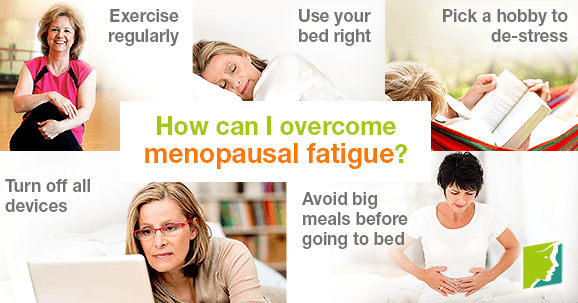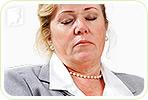Fatigue can result from menopause symptoms such as night sweats, which may make it more difficult to sleep. Menopause can also cause tiredness and fatigue on its own. Aging changes sleep patterns, and many people find that they have more trouble sleeping as they age. However, sleeplessness should not be an accepted part of menopause and aging. There are many different lifestyle changes and treatments that you can utilize in order to reduce fatigue and help you sleep soundly and deeply.
What Causes Menopausal Fatigue?
More research needs to be done to examine why menopausal women tend to feel more fatigued and tired. However, the body of research that currently exists offers many different explanations for why this may be, and these reasons continue to be explored.
Research has shown that menopausal women are two to three times more likely than premenopausal women to experience disruptive changes in their breathing when asleep. Night sweats and anxiety can also interrupt sleep patterns.
Women who go through menopause early and experience other gynecological problems, such as irregular and painful periods, are more likely to suffer from chronic fatigue syndrome. This may be because both chronic fatigue syndrome and gynecological problems are connected to sex hormone levels. Symptoms of chronic fatigue syndrome include constant tiredness and muscle and joint pain.
What Are the Dangers of Menopausal Fatigue?
Menopause fatigue and a lack of sleep do not only affect a woman's quality of life, but can also lead to serious health consequences such as high blood pressure and increased risk of injury and cardiovascular disease. Research has shown that women who sleep only six hours a night are 14% more likely to have a stroke than those who sleep seven hours a night.
What Are the Symptoms of Menopausal Fatigue?
The symptoms of menopause fatigue include:
- General tiredness and a feeling of being worn out
- Lack of energy
- Sleepiness during the day
- Increased irritability
How Can I Overcome Menopausal Fatigue?
Lifestyle changes that can help a person sleep better and reduce fatigue include:
- Exercising regularly. Exercise is great for overall health, but exercise too late at night can impair sleep.
- Adjusting your diet. Avoid big meals before going to bed, but having a snack, such as a glass of warm milk, can help. Also, try to decrease consumption of alcohol and caffeine before bed.
- Picking up a hobby to de-stress. Yoga, meditation, and other relaxing techniques can ease stress and reduce overall fatigue. Yoga also doubles as low-impact exercise.
- Turning off the television, smart phone, and laptop before bed. Artificial light from these screens can disturb your sleep schedule and make it more difficult to fall asleep. Try reading a book or journaling before bed instead.
- Using your bed only for sleeping and sex. When you use your bed for activities outside of these two, such as for working or relaxing, your body may have a more difficult time associating the bed and bedroom with sleep.
If your fatigue continues or is lowering the quality of your life, it is a good idea to talk with a doctor.
Sources
- National Institute on Aging. (2015). A Good Night's Sleep. Retrieved October 15, 2015, from https://www.nia.nih.gov/health/publication/good-nights-sleep
- Roumiana, S. et al. (2015). Early menopause and other gynecologic risk indicators for chronic fatigue syndrome in women. Menopause, 1. doi: 10.1097/GME.0000000000000411




